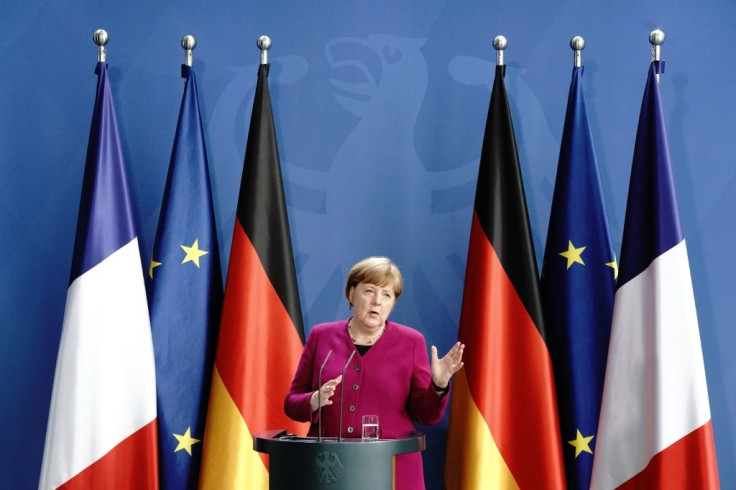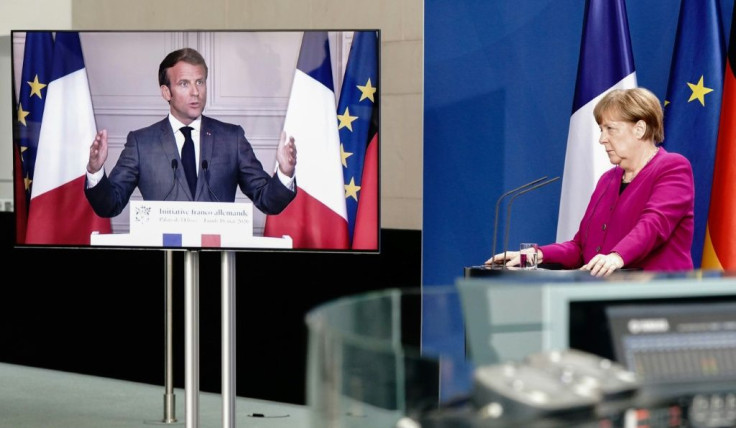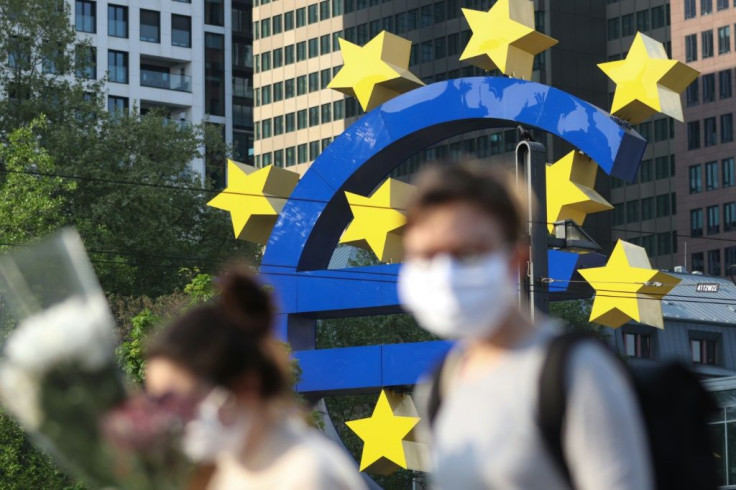Merkel In High-wire Act To Sell EU Recovery 'U-turn'
Angela Merkel will need to spend much of the political capital she banked during the coronavirus pandemic to rally Germans behind a massive European recovery package that marks a sharp break with Berlin's budget orthodoxy.
Flying high in the polls because of seemingly steady, science-based leadership through the crisis, the German chancellor agreed in a teleconference with French President Emmanuel Macron on Monday to push for a 500-billion-euro ($544 billion) European Union fund to fight devastating economic fallout.
The "once in a lifetime" money pot would be available as subsidies to help the most stricken among the EU's 27 members bounce back.
It would notably be underwritten with joint borrowing by the bloc -- until now a taboo in Europe's top economy.
Germany would foot about 135 billion euros of the total bill for the proposal, which needs the unanimous support of member states.

The announcement sparked alarm among Merkel's fellow conservatives.
"This is nothing less than a complete U-turn by the German government," the right-leaning Frankfurter Allgemeine Zeitung said.
"Perhaps it is in Germany's self-interest to do all it can to save the EU politically and economically," the newspaper said. "But the EU's rules and principles should not be jettisoned overboard too quickly."
It called on Austria, the Netherlands, Denmark and Sweden -- dubbed the "frugal four" -- to make good on their pledge to block grants to debt-mired countries and instead push for loans that would need to be repaid.

Conservative daily Die Welt said there was "hardly an alternative" to the "gigantic aid payments".
But, it warned, "the Germans are going to be hit especially hard as, by far, the biggest paymaster".
Alexander Graf Lambsdorff of the opposition pro-business Free Democratic Party warned there would be a "lively debate" about the measures, telling ZDF public television that he was "very sceptical" that the plan would be realised.
However Merkel's CDU/CSU parliamentary group expressed at least initial support, calling the plan a "strong contribution to European solidarity" while "respecting German budgetary limits" as a programme on the EU's books -- not Berlin's.

The president of Berlin's Hertie School of Governance, Henrik Enderlein, agreed that the fund was unlikely to run into the kind of trouble seen with the German Constitutional Court's ruling this month questioning massive bond-buying by the European Central Bank.
"This is EU fiscal policy and will be mandated by the German parliament," he said. "If approved, there is no way this can be stopped in courts."
Germany has long opposed so-called "eurobonds" -- and a more recent proposal for "coronabonds" -- which would lower borrowing costs for partners in trouble by pooling debt, arguing it would encourage profligate governance.
But the severity of the crisis seemed to focus minds in Berlin, leading Merkel to take a bold step, which she defended with unusually emotional rhetoric.
Calling the initiative "a vital contribution to ensuring the future of the EU", Merkel insisted: "We have got to act in a European way so we can emerge from this crisis, and emerge from it strengthened."
Der Spiegel said the proposal would probably mean both Macron and Merkel would face "a whole lot of grief" but argued that it elegantly solved a political problem for each of them.
"Merkel will now be able to avoid coronabonds while Macron can at least in the short term distract attention from domestic crises with this foreign policy success -- vive l'amitie, long live the friendship," said the weekly magazine.
Germany has weathered the corona storm far better than most of its partners, with lower death rates and slowing infection rates permitting both a less-severe lockdown and a quicker reopening than in many EU countries.
Nevertheless, the outbreak has already plunged the country into recession, with gross domestic product set to shrink by a record 6.3 percent this year.
During the eurozone debt crisis, Germany demanded austerity in exchange for rescue packages for countries such as Greece, deepening their at least short-term suffering while fuelling virulent anti-German sentiment.
This time Merkel appeared to judge the emergency differently as it was caused by external factors beyond EU countries' control and packs the potential to do lasting damage to the bloc.
A source close to Macron said Merkel, who has said she will not run for a fifth term next year, may have an eye on her legacy as Europe's longest-serving leader.
"She was keen to reaffirm Germany's European commitment in the face of quite strong criticism from Italy and Spain," the source said.
"She is also aware that Germany assumes the EU presidency in July. She wants to leave her mark."
© Copyright AFP 2024. All rights reserved.





















